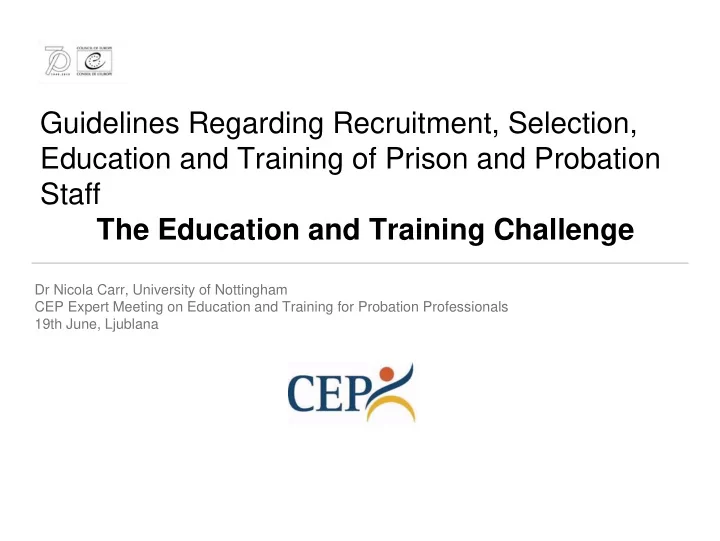

Guidelines Regarding Recruitment, Selection, Education and Training of Prison and Probation Staff The Education and Training Challenge Dr Nicola Carr, University of Nottingham CEP Expert Meeting on Education and Training for Probation Professionals 19th June, Ljublana
Guidelines adopted by the European Committee on Crime Problems at their 76 th plenary meeting (25 April 2019) Guidelines available at: https://rm.coe.int/guidelines-training-staff/1680943aad
Areas Covered in the Guidelines Entry educational levels of staff Criteria regarding recruitment and selection Advertising posts Entry assessment procedures Education and training Professional development Professional ethics Education and training matrix
Essentials of Success “ The right choice of a probation officer. This should be the paramount consideration for upon him everything depends. If he is strong and brave and earnest he can carry on his work in spite of difficulties of organisation and administration important as these may be. He should possess: a. Distinctive personality. Upon this his power of influence depends. b. A real profession. Probation can never, and should never be, a mere untrained vocation. c. A good general education. The want of this tends to produce a narrowness of view inconsistent with the best work. d. Special study in sociology and economics and some knowledge of psychology and of criminal law and practice. e. A very careful training in the best courts and under the most efficient probation officers. ” Sir William Clarke Hall (1933) ‘The extent and practice of probation in England’ In: S. Glueck (ed.) Probation and Criminal Justice: Essays in Honour of Herbert C. Parsons.
Entry Level Qualification: Level 6 EQF Responsibility and Knowledge Skills Autonomy Advanced knowledge Advanced skills, Manage complex of a field of work or demonstrating mastery technical or study, involving a and innovation, professional activities critical understanding required to solve or projects, taking of theories and complex and responsibility for principles . unpredictable problems decision-making in in a specialised field of unpredictable work or work or study. study contexts; take responsibility for managing professional development of individuals and groups.
Entry Educational Levels
Knowledge Base Broadly speaking, the project of neoliberal politics with regard to Probation, has seen the replacement of a sociological, ‘social work’ value base with a criminological, technological ideology which focuses on personal culpability. It prefers to locate criminal causality in the dysfunctional psychology of the individual rather than their social context and the impact of external events and factors. In my view this de- humanises our approach to clients, by shifting the onus onto them as largely responsible for their lives and actions, and stressing assessments of risk over consideration of life-experiences. (Practitioner writing in Probation Journal)
Education and Training • Induction training curricula for newly recruited staff should be a balanced mixture of theory, practice and experiential knowledge. • In-service training should be provided to all staff and should include refresher courses on different priority topics and/or additional training. • In-service training should be linked to national frameworks for continuous professional development. • Mix of grades and staff roles, inter-agency and cross- border.
Education and Training • New staff at entry level: protected period of employment (with tutorship and lower levels of responsibilities). • Education and training curricula should be regularly assessed and evaluated to assess fitness of purpose and effectiveness. • Training needs should be considered as part of professional development (appraisals)
Education and Training Matrix • Matrix provides an overview of training elements reflecting the probation role that could be incorporated into training provision for probation staff working directly with suspects or offenders in a supervisory capacity, depending on their specific role and duties, including those working in prisons. • Supporting on-going professional development. • Indicative rather than proscriptive. • Provides an overview of elements of training with a brief descriptor that could be included as part of staff induction and/or as elements of in-service. • Training components reflect the components and stages of the probation role as outlined in the Recommendations CM/Rec (2010) 1 on the Council of Europe Probation Rules, CM/Rec (2017) 3 on the European Rules on community sanctions and measures and CM/Rec (2018) 8 concerning restorative justice in criminal matters.
Working Effectively Promoting Programmes and Practice in Legal to Promote compliance and Interventions Context: National, Change dealing with non- International and compliance Rights-Based Case Management Report Writing Risk assessment: Specific Types of Principles, Offending Practices and Proficiency Inter-agency Case records, data Electronic Anti-discriminatory working and protection and monitoring and use practice community context confidentiality of technology in probation practice Working with Gender Mental health, Working with juveniles responsiveness intellectual foreign national disabilities, suspects and substance misuse offenders
Discussion points? Should a university degree provide a foundation or part of the core training for probation staff? Is there scope for probation agencies to work with educational providers regarding course specifications? And/or should probation agencies focus on scaffolding existing learning through induction and in-service training?
Conclusion • Educational qualifications: generalist/subject-specific • Relationship of probation agencies with education providers • Balancing emphasis on induction training and continuous professional development • Accreditation
Recommend
More recommend